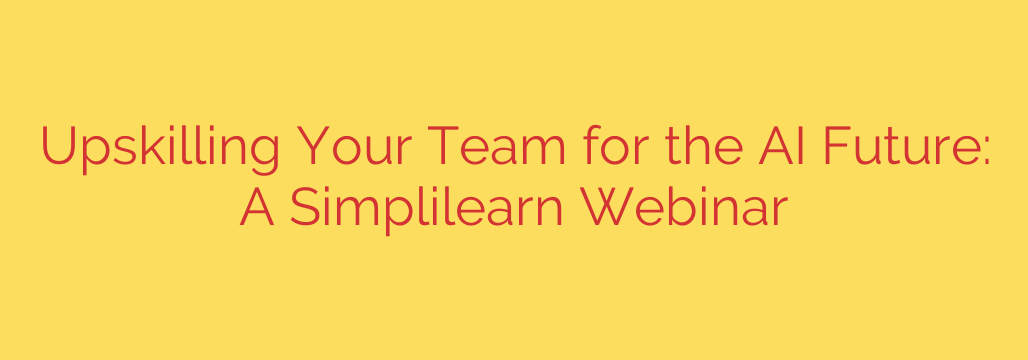
Future-Proof Your Workforce: A Strategic Guide to Upskilling Your Team for the AI Era
Artificial intelligence is no longer a distant future; it’s a present-day reality reshaping industries and redefining what it means to be competitive. For businesses, the question is no longer if they should adopt AI, but how they can integrate it effectively to drive growth, innovation, and efficiency. The answer lies not just in technology, but in your most valuable asset: your people.
Investing in a strategic upskilling program is the most critical step you can take to prepare your organization for the AI-powered future. It’s about transforming your current workforce into a team that is not only ready for change but can actively lead it.
Why AI Upskilling is No Longer Optional
The rapid advancement of AI has created a significant skills gap. Roles are evolving, and the abilities required to succeed are shifting dramatically. Companies that fail to upskill their employees will find themselves at a severe disadvantage, struggling to innovate and keep pace with the competition.
On the other hand, organizations that proactively invest in AI training see remarkable returns. They empower their teams to leverage new tools, automate repetitive tasks, and focus on high-value strategic work. This isn’t just about future-proofing; it’s about unlocking new levels of productivity and creativity right now.
The Core AI Competencies Every Business Needs
Preparing for the AI future requires a multi-layered approach to skill development. It’s not just about hiring data scientists; it’s about cultivating a broad spectrum of AI-related abilities across your entire organization.
Your training initiatives should focus on three key areas:
- Foundational AI Literacy: This is the baseline for all employees. Everyone, from marketing to HR, should understand the basic concepts of AI and machine learning. This includes data literacy, an awareness of AI ethics and responsible use, and practical knowledge of how to use common AI-powered tools securely and effectively.
- Essential Technical AI Skills: For your technical teams, deeper expertise is required. These are the skills that allow you to build, manage, and deploy AI solutions. Key areas include Machine Learning (ML), Data Science and Analytics, Natural Language Processing (NLP), and the increasingly crucial skill of Prompt Engineering for interacting with generative AI models.
- Strategic AI Skills for Leadership: Your managers and executives need to know how to steer the ship. This involves developing an AI strategy that aligns with business goals, understanding how to manage AI projects, and establishing clear frameworks for AI governance and risk management.
How to Build a Successful AI Upskilling Program: A Step-by-Step Approach
Creating an effective AI training program requires a deliberate and strategic plan. Simply offering a few online courses is not enough. Follow these steps to build a program that delivers real results.
Conduct a Skills Gap Analysis: Before you can build, you must assess. Evaluate the current capabilities within your team and compare them against the skills your organization will need in the next one to three years. This analysis will be the blueprint for your training program.
Align Training with Business Objectives: Your upskilling efforts must be directly tied to concrete business goals. Do you want to improve customer service with AI chatbots? Boost marketing ROI with predictive analytics? Define your objectives first, then build the learning pathways to support them.
Design Flexible and Customized Learning Pathways: One size does not fit all. Offer a blend of learning formats—such as self-paced online modules, expert-led virtual workshops, and hands-on capstone projects—to cater to different roles and learning styles. The goal is to move employees from basic awareness to deep expertise.
Foster a Culture of Continuous Learning: Leadership must champion the importance of upskilling. Encourage experimentation, provide dedicated time for learning, and celebrate progress. When employees see that the company is genuinely invested in their growth, they are far more likely to engage with the training.
Measure, Refine, and Repeat: Track key performance indicators (KPIs) to measure the impact of your program. Are certified employees more productive? Has the company successfully launched new AI-powered initiatives? Use this data to refine your curriculum and demonstrate the ROI of your investment.
The Tangible Benefits of Investing in Your People
Upskilling your existing workforce for the AI era offers a powerful return on investment that goes far beyond just filling a skills gap.
- Enhanced Innovation: An AI-literate team can identify new opportunities for automation and product development that others might miss.
- Improved Employee Retention: Investing in your employees’ professional development is a proven way to boost morale and loyalty. Talented individuals want to work for companies that help them grow.
- Increased Productivity: When teams can effectively use AI tools, they can automate routine tasks and dedicate more time to complex problem-solving and strategic thinking.
- Significant Cost Savings: Upskilling your current employees is often more cost-effective than competing for the small and expensive pool of external AI talent. You also retain valuable institutional knowledge.
The journey to AI maturity begins not with a massive technology purchase, but with a commitment to your team. By building a robust upskilling program, you empower your workforce to become the architects of your company’s future success.
Source: https://www.simplilearn.com/ai-era-workforce-empowerment-webinar








